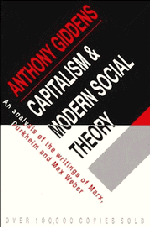Book contents
- Frontmatter
- Contents
- Acknowledgements
- Preface
- Introduction
- List of abbreviations used
- Dedication
- Part 1 Marx
- 1 Marx's early writings
- 2 Historical materialism
- 3 The relations of production and class structure
- 4 The theory of capitalist development
- Part 2 Durkheim
- Part 3 Max Weber
- Part 4 Capitalism, socialism and social theory
- Postscript: Marx and modern sociology
- Bibliography of works cited in text
- Index
3 - The relations of production and class structure
Published online by Cambridge University Press: 05 August 2013
- Frontmatter
- Contents
- Acknowledgements
- Preface
- Introduction
- List of abbreviations used
- Dedication
- Part 1 Marx
- 1 Marx's early writings
- 2 Historical materialism
- 3 The relations of production and class structure
- 4 The theory of capitalist development
- Part 2 Durkheim
- Part 3 Max Weber
- Part 4 Capitalism, socialism and social theory
- Postscript: Marx and modern sociology
- Bibliography of works cited in text
- Index
Summary
According to Marx, the development of society is the result of the continual productive interaction between men and nature. Men ‘begin to distinguish themselves from animals as soon as they begin to produce their means of subsistence…’. The ‘production and reproduction of life’ is both an exigency dictated by the biological needs of the human organism and, more importantly, the creative source of new needs and capabilities. Thus productive activity is at the root of society in both an historical and an analytical sense. Production is ‘the first historical act’; and ‘the production of material life … is … a fundamental condition of all history, which today, as thousands of years ago, must daily and hourly be fulfilled merely in order to sustain human life’. Every individual, in his day-to-day actions, recreates and reproduces society at every moment: this is both the source of what is stable in social organisation and the origin of endless modification.
Every kind of production system entails a definite set of social relationships existing between individuals involved in the productive process. This is at the root of one of Marx's most important criticisms of political economy and of utilitarianism generally. The conception of the ‘isolated individual’ is a construction of the bourgeois philosophy of individualism, and serves to conceal the social character which production always manifests. Marx refers to Adam Smith as the ‘Luther of political economy’ because he, and after him the other economists, have correctly identified labour as the source of man's own self-creation.
- Type
- Chapter
- Information
- Capitalism and Modern Social TheoryAn Analysis of the Writings of Marx, Durkheim and Max Weber, pp. 35 - 45Publisher: Cambridge University PressPrint publication year: 1971
- 1
- Cited by



